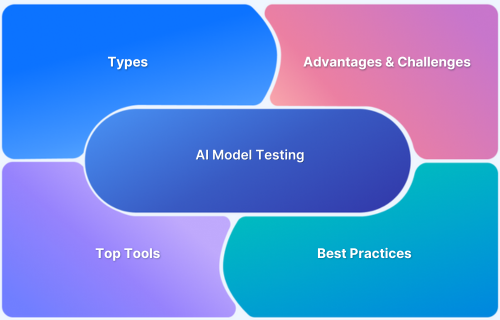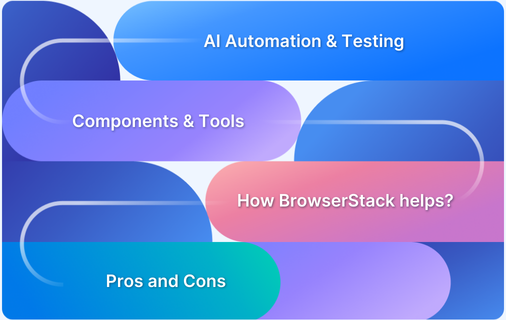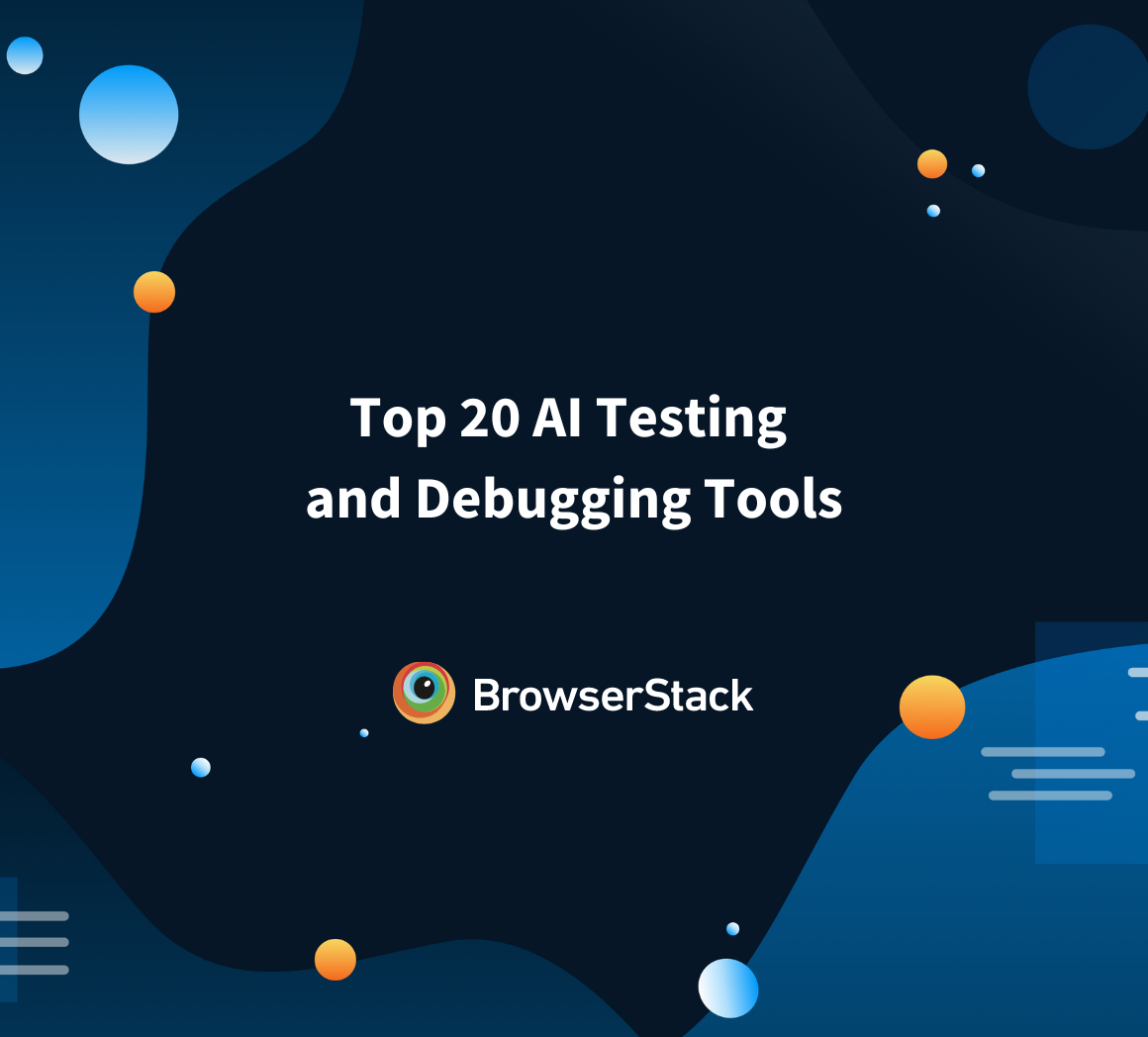As AI-driven apps are growing rapidly across various industries, analyzing the models and testing their performance is essential. This helps reduce mistakes, biases, and security issues in these apps.
Overview
What is AI Model Testing?
AI Model Testing is the process of evaluating AI systems to ensure they perform accurately, fairly, securely, and reliably in real-world scenarios.
Types of AI Model Testing:
- Functional Testing
- Integration Testing
- Performance Testing
- Bias and Fairness Testing
- Security Testing
- Data Validation Testing
- Regression Testing
Tools and Frameworks for AI Model Testing
- TensorFlow Data Validation
- DeepChecks
- LIME
- CleverHans
- Apache JMeter
- Seldon Core
This article discusses the different forms of AI model testing in detail and briefly describes the tools used, the challenges faced, the guidelines to be followed, and the significance of testing on actual devices.
What are AI Models?
An AI model is a mathematical and computational system trained to perform specific tasks by learning patterns from data. It mimics human-like intelligence to make predictions, recognize patterns, generate content, or make decisions.
These models are trained on data to provide predictions or conclusions without human assistance. The AI models support apps across different sectors, such as e-commerce, healthcare, banking, etc.
The major categories of AI Models are mentioned below.
- In Supervised Learning, models gain knowledge from labeled data in order to predict or take action.
- Models find patterns and structures through Unsupervised Learning for unlabeled data.
- In Reinforcement Learning, models pick up new skills by making blunders and get rewarded or punished for them.
- Multiple-layer artificial neural networks are used in Deep Learning, which is a branch of machine learning, to interpret data.
- In Generative Learning, models create new content like text, images, or audio by learning patterns from existing data.
Read More: Mastering Test Automation with ChatGPT
What is AI Model Testing?
AI Model Testing is the procedure of testing and assessing an AI model carefully to make sure it is functioning as intended. Different aspects of the AI model, such as its actual performance, accuracy, and fairness, are considered during the testing process.
Examples of applications using AI models include Google Gemini, OpenAI’s ChatGPT, Amazon Alexa, Google Maps, etc.
AI model testing is essential for achieving the following:
- Predictions that are accurate.
- Reliability in practical circumstances.
- Strong security and making decisions without bias.
Types of AI Model Testing
Different types of AI Model Testing are:
- Functional Testing: It verifies if the AI model performs its intended task correctly.
- Integration Testing: When different AI Models with conflicting goals are deployed simultaneously, integration testing is required.
- Performance Testing: It helps models effectively handle large datasets and function as expected in various circumstances.
- Bias and Fairness Testing: It examines the predictions of AI models among different backgrounds to identify if there is any bias in AI judgments.
- Security Testing: It is to make sure that the models are immune to malicious inputs that can cause misleading predictions or conclusions.
- Data Validation Testing: It is to check for data distribution phases, deviations, missing values, and inaccurate labels that could impact the model’s performance.
- Regression Testing: It reassures that any updates to an AI model do not lead to a performance degradation or any occurrence of new defects.
Automated Testing for AI Models
AI models are becoming a core part of modern applications. As these models grow more complex, testing them manually becomes slow and inefficient. In this situation, automated testing makes a real difference.
Automated testing enables quick and accurate validation of AI models. It speeds up the test procedures and reduces human effort. It also fits perfectly into CI/CD pipelines, making it easier to deliver reliable AI solutions.
The key benefits of Automation testing for AI Model Apps are:
- It expands the testing scope and coverage areas.
- Minimizes human errors in testing.
- Enables fast and complete evaluation of functionalities.
- Reduces long-term testing costs by minimizing manual efforts.
Advantages of AI Model Testing
AI Model Testing has several advantages such as,
- Improves Accuracy and Reliability: It enables the creation of dependable AI systems that deliver precise, consistent results, which leads to better decision-making and fewer errors.
- Ensures Fairness and Reduces Bias: Promote ethical AI by minimizing discrimination, boosting user trust, and supporting regulatory compliance.
- Identifies Security Vulnerabilities: Strengthen model security by detecting adversarial threats and data manipulation risks before they cause harm.
- Enables Smooth System Integration: Results in frictionless collaboration between AI models and business applications to improve workflow efficiency.
- Saves Time and Resources through Automation: Automate testing processes to cut costs, reduce manual efforts, and speed up development cycles.
- Boosts Real-World Performance: Optimize model behavior under real-world conditions to improve end-user experience.
Read More: AI Automation and Testing
Challenges in AI Model Testing
AI Model Testing also has several drawbacks despite its greater potential.
- Absence of Consistent Results: AI models can generate distinct results when given the same inputs.
- Changing Data Distribution: In order for models to stay up-to-date, they must be revised frequently.
- Detecting and Eliminating Bias: Identifying and eliminating bias is complex. Maintaining fairness across diverse data is an ongoing challenge.
- Computational Complexity: Testing AI models requires a large processing capacity.
- Adversarial Attacks and Security Risks: AI models are susceptible to adverse manipulation.
Read More: Software Testing Challenges with Solutions
What are the Advanced Techniques in AI Model Testing?
Here are some of the advanced techniques to be implemented in AI model testing:
- Adversarial testing: Creating slightly modified inputs to deceive AI models and test how trustworthy they work.
- Data & Concept Drift Detection: Tracks how the interconnections or information provided changes. Evidently, AI is one such tool that can help with this.
- Edge Case Testing: Testing AI models using very rare input information to validate if the model works as expected in rare case scenarios.
- Differential Testing: This compares a set of iterations of different AI models to identify any issues or improvements required.
- Robustness & Stress Testing: It is to verify the AI’s performance is stable even when data is lacking or incomplete.
- Continuous Monitoring: AI models are tracked by continuous monitoring and A/B testing to evaluate models and increase their performance in the real world.
Tools and Frameworks for AI Model Testing
Take a look at the top tools and frameworks for AI model testing, their key features, pros and cons.
1. TensorFlow Data Validation
TensorFlow Data Validation is a library designed for analyzing and validating data used in AI models.
Key Features:
- TensorFlow is compatible with various platforms and devices, including mobile and remote servers.
- TensorFlow can be downloaded without purchasing a license because it is free.
- TensorFlow is being actively modified in response to user input.
Pros:
- It ensures data consistency for AI models.
- It is scalable for large datasets.
- It integrates well with TensorFlow Extended.
Cons:
- TensorFlow model debugging can be a bit difficult.
- It focuses only on data validation and not full model testing.
Read More: Top 12 AI Automation Testing Tools
2. DeepChecks
DeepChecks is an open-source tool used to test and monitor machine learning models.
Key Features:
- It facilitates feature drift detection, data validation, and model stability testing.
- It produces detailed test reports for the AI pipelines.
- It uses machine learning frameworks based on Python.
Pros:
- DeepChecks delivers a complete validation of the AI models.
- It is an open-source tool and can be customized according to needs.
- It assists in identifying issues with data and the performance of the model.
Cons:
- There is a necessity for understanding ML and Python language.
- Setup procedures can be a bit complicated for non-technical users.
3. LIME (Local Interpretable Model-agnostic Explanations)
LIME is a tool used to test the explainability of AI models. It helps users understand predictions provided by black-box machine learning models.
Key Features:
- It helps generate explanations for AI predictions.
- It also supports multiple ML models.
- It assists in debugging and interpreting AI based decisions.
Pros:
- This tool enhances the transparency of the AI models.
- It can work across different ML frameworks.
Cons:
- It can be computationally very expensive in nature.
- It does not provide reliable results for complex models.
4. CleverHans
CleverHans is a toolkit which focuses on security. It is used to test the robustness of AI models against adversarial attacks.
Key Features:
- It also supports different attack strategies to ensure that the model is robust.
- It can also work with TensorFlow and PyTorch models.
Pros:
- CleverHans is a crucial tool for AI model security.
- It assists in defending AI models against vulnerability to adversarial attacks.
- This tool is open source and can be personalized.
Cons:
- It also requires advanced knowledge on ML models.
- This tool is fully focused on adversarial testing and not the overall AI performance.
5. Apache JMeter
Apache JMeter is a tool that can be used to test AI-based applications for scalability and stress handling.
Key Features:
- It can be used to perform API load testing for AI-based applications.
- It is able to simulate multiple user scenarios and evaluate the response times.
- It can be integrated with CI/CD pipelines.
Pros:
- Apache JMeter is an open-source tool and commonly used for performance testing.
- It has a strong community support.
- It helps to analyze any performance setbacks in AI models.
Cons:
- It has limited testing features that are specific to AI.
- Scripting is essential for advanced test scenarios.
6. Seldon Core
Seldon Core is a framework based on Kubernetes which is used for deploying and maintaining AI models in production.
Key Features:
- It allows the scalable deployment of AI models.
- It also supports real-time monitoring of the models.
- It is flexible and compatible to work with other ML frameworks.
Pros:
- It uses pre-built Docker images to make model deployment easier.
- It contains tools to assist with tracking model usage and performance.
- It has built-in monitoring and security-related features.
Cons:
- Expertise in Kubernetes is mandatory.
- Setting up seems to be complex for small-scale AI projects.
The above mentioned tools and technologies provide different types of features for testing AI models. User requirements and unique needs for AI testing determine the best tool for the job.
What are AI Agents and how can they help in AI Model Testing?
AI agents are autonomous systems powered by Artificial Intelligence that can sense their environment, make decisions, and take actions to achieve specific goals.
In the context of testing, these AI agents can analyze data, learn from patterns, and execute tasks. It works just like a human tester, but faster and more consistently.
In AI model testing, AI agents help in:
- Automatically generating and executing test cases based on model behavior and usage patterns
- Detecting anomalies or performance deviations that might be missed by traditional test scripts
- Adapting test strategies dynamically as the AI model evolves or encounters new data
- Speeding up test cycles by identifying redundant tests and prioritizing critical paths
- Providing intelligent insights and reports for faster debugging and model validation
BrowserStack is a testing platform that goes beyond traditional testing and integrates AI agents to streamline workflows and significantly boost productivity. These intelligent agents assist testers by automating repetitive tasks, identifying issues, and optimizing test execution strategies.
Best Practices for AI Model Testing
Testing AI systems involves evaluating their efficiency, performance, dependability, and fairness. Here are some best practices to consider:
- Make use of actual data for testing and training.
- Automate test scenarios that are repeated.
- Continue to track model performance and conduct fairness and bias tests.
- Update models frequently with fresh data.
- Make sure AI model actions can be traced back.
- Study AI models in many different types of actual-life scenarios.
- Test application on real devices and browsers.
Read More: 13 Open Source AI Testing Tools
Why choose Real Devices for AI Model Testing?
Testing AI models on real devices is essential to ensure accuracy, reliability, and performance in real-world conditions. While simulators and emulators are helpful for early-stage testing, they often fail to replicate actual user environments.
The main advantages of using real devices for AI model testing are given below.
- It ensures that the performance evaluations of the AI models are accurate.
- It helps to discover UI/UX flaws in the application.
- It enables testing AI-powered web and mobile apps in real user conditions.
- It makes AI models stronger and more resilient on various platforms.
- Measure how AI models respond to real network conditions, CPU load, and device memory constraints.
- Ensure UI elements render correctly across different screen resolutions and device types.
BrowserStack is a leading test platform that allows users to test websites and mobile apps. It gives instant access to a wide range of actual desktop and mobile devices on cloud, without the need for physical infrastructure.
Try BrowserStack for AI Model Testing
Conclusion
AI model testing is essential to ensure that AI applications are safe, impartial, and dependable. Teams may validate the accuracy and reliability of their AI-driven approaches using testing tools like BrowserStack, standard procedures, and automated technologies.





